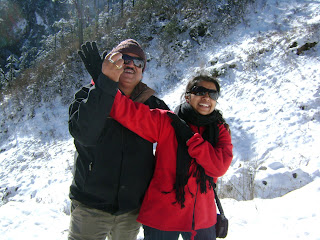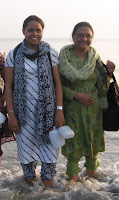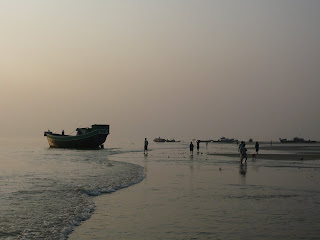
Hello all! Happy new year! What a whirlwind it's been these last few weeks - my Dad came to visit, I traveled to Mumbai and Rajasthan, Christmas came and went, and we had our annual staff retreat to boot! Yep, here in the Banaras Branch Office we've launched into 2009 with a bang, embarking on our staff retreat to Sikkim and Kolkata just days into the new year. There's tons to tell, so I'm just going to launch right into it and hope to do it justice....true to form, we kicked off our trip with a 24+ hour train delay (not unsurprising, though definitely disappointing), but after a day and a night on the train, a day on a bus, and a short taxi ride, we found ourselves in paradise on earth. Sikkim. And it was worth the wait! Gangtok is a beautiful capital city as it is well-kept, situated high up in the mountains, and my fave, has an awesome ropeway that offered us a spectacular ride above its rolling hills and valleys.
From Gangtok we went even further up north to Lachung, a hillstation in North Sikkim near the Indo-Chinese border. In Lachung

we made a bonfire, sang songs, and had an impromptu dance party. It was such a treat to let loose and be silly together, and in such a magnificent setting no less. The night ended along with the firewood, although sleep didn't come quite as easily. It was so cold! Oh my god it was cold...I wish I could say that I have some kind of Winnipeg-powered forcefield that enabled me to absorb that kind of cold, but alas, I froze along with everyone else. Cursing and longing for central heating (I blame it for my wimpiness) Melissa and I cemented our friendship by shamelessly using one another as human heating units in our shared bed. At one point our heating method consisted of some tentative experiments in kicking and rubbing our feet against one another. Our conclusion? Good for some giggles, though perhaps not the greatest long-term solution (hey, you never know...)
The next day we began our drive up to the Yum Thang valley. The drive itself was absolutely breathtaking. With the Teesta river flowing in the valley below, gorgeous clear blue sky above, and mind blowing mountains flanking us on all sides, I felt about as lucky as I ever had. I mean, was I really there? Eventually, we were forced to stop short of o

ur destination due to poor road conditions, but this didn't prevent everyone from having a blast climbing hills and throwing themselves (and others!) in the snow. Looking at my coworkers frolicking in the snow (and some for the very first time!), covered head to toe in snow and each looking happier than the next, I was reminded of how fun winter can be, if you let it. Following their lead, I promptly reverted back to my 8-year old self and initiated Pravin in the joys and tribulations of the Winnipeg schoolyard recess: the facewash. Throw in a snow angel or two, a snowman, and a couple snowballs, and we might as well have been waiting for the school bus to pick us up after school.
From Sikk

im we then turned southward to Kolkata. After an exciting nail biter of a journey from Gangtok to the train station (an adventure worthy of another 1000 words), we took another overnight train to Kolkata. Once there we embarked on a journey to Ganga Sagar, the confluence point of the Ganges river and the Indian Ocean. As a major Hindu pilgrimage sight, this was obviously a much anticipated journey for most of WLC's staff, and a privileged opportunity for me to witness a meaningful spiritual ritua

l. Bathed by the sun's rays and showcasing a canvas of milky greys and pinks, Ganga Sagar was a surprisingly serene place to reflect, to bathe, or simply be. Amidst laughter and playfulness, nearly everyone took their bath within an hour or two, and all emerged refreshed and in good spirits. After a lightning fast pit stop at the temple we hurried back to catch our ferry, where we were met by a tiny glimpse into the life of a pilgrim. This is hard to convey to the average Canadian - used to our picture perfect queues and people excusing themselves when
we bump into them - but the ramp leading up to the ferry was essentially a free for all. Push or be pushed, this was the ticket to getting on that boat. in a situation like that many people could b

e scared or stressed, but not WLC's staff. Nope, everyone was in high spirits, playfully teasing one another by secretly pulling one another's shawls, hats, and scarves when they weren't looking. With all that laughter, food passed around overhead, and the general sense of ease that everyone clearly had, it was actually pretty fun. Although I'm sure my mom still doesn't like the sound of it...:)
In Kolkata we visited the Victoria Memorial, Science City, did some shopping, had an excellent feast, and best of all, went to the Kalighat Temple. That was for me one of the most powerful experiences I've had in India so far, and I doubt that I will ever forget it. Walking barefoot through filthy alleyways towards the temple, pushing my way forward with pilgrims and coworkers by my side, I eventually found myself squeezed through a narrow doorway into a courtyard thick with incense and bodies. Following the circuit into the temple we witnessed the rare sacrificial killing of a goat, after which I was lead up some stairs into a room crammed with bodies and spiritual energy. People broke into a song, flowers flew above, and bells clanged madly as everyone pulsated towards the Kali idol

in the centre of the temple. Feeling Pravin's pull, Thursica and I suddenly found ourselves in the throngs of people no longer pushing in but pushing out. On the street again and strolling at a snail's pace, the walk back was almost just as good as being inside the temple. Quietly smiling to myself, it was a moment where I stopped long enough to realize that I had been relishing the privilege of sharing this experience with the rest of the staff. I think it was then that it became clear to me that this staff retreat had not only allowed me to explore India and forge stronger relationships with my coworkers, but it also took me for a ride through Indian culture and spirituality that I could have never done on my own.

On one of our last nights together, Neetu, Bhavana, and Melissa and I were walking together towards our string of vehicles, and Bhavana said to us that this would surely be an adventure that we would never forget. Giggling, the four of us agreed. It was exciting, moving, at times hilarious, and an experience unlike any other. It's my first staff retreat, but I'd definitely venture to say that it's the best one yet :)
 eriod in time. And yet looking back it seems to me so far removed from my life here that it can hardly be one and the same. Only five weeks since my return and my experience there feels like a parallel life, perhaps a feeling made stronger by the sense that Varanasi is in fact another planet in itself.
eriod in time. And yet looking back it seems to me so far removed from my life here that it can hardly be one and the same. Only five weeks since my return and my experience there feels like a parallel life, perhaps a feeling made stronger by the sense that Varanasi is in fact another planet in itself.















.jpg)




























